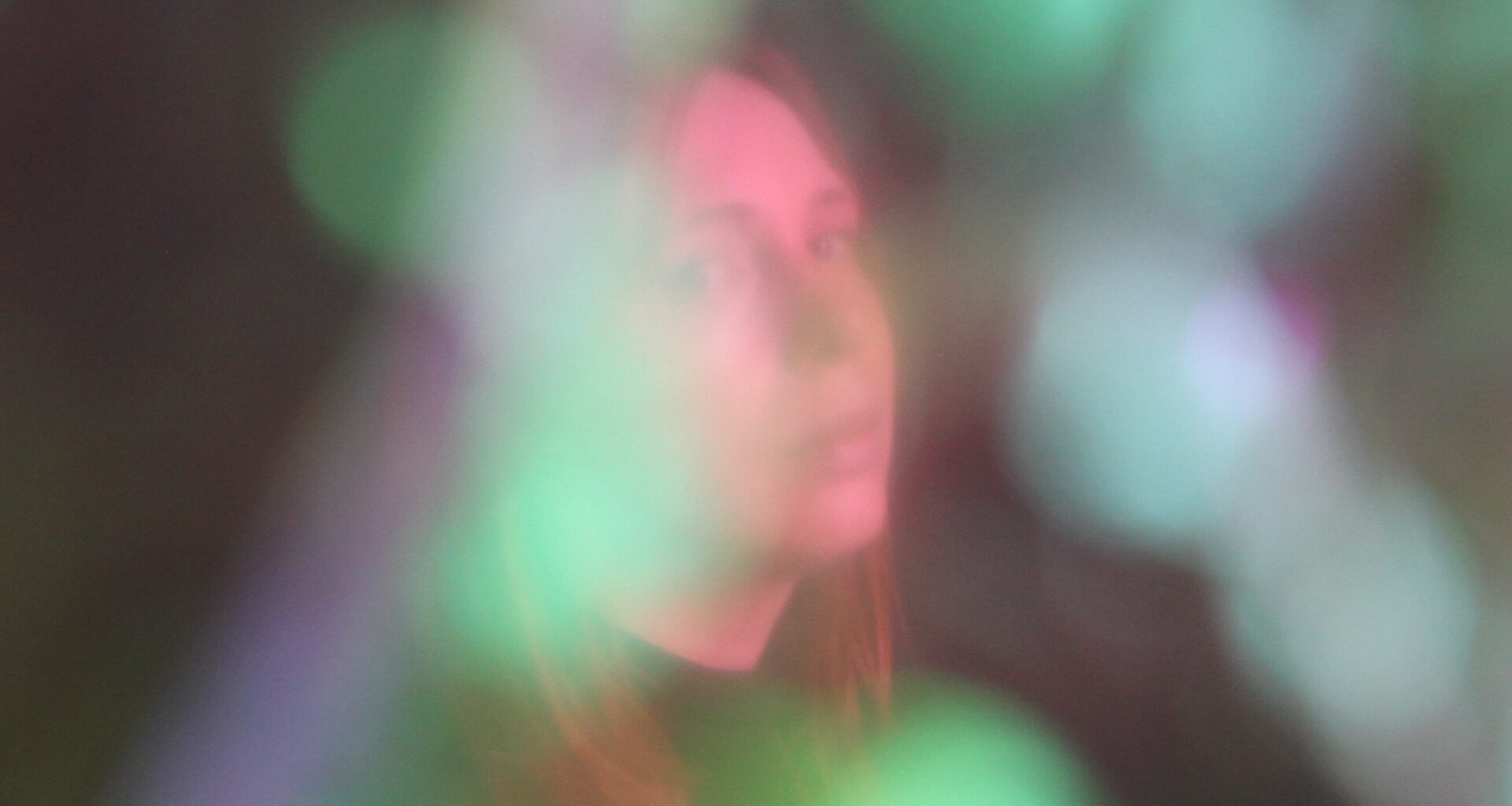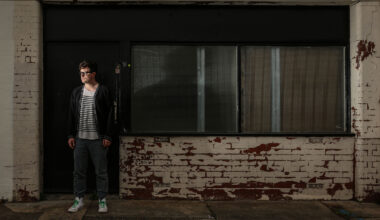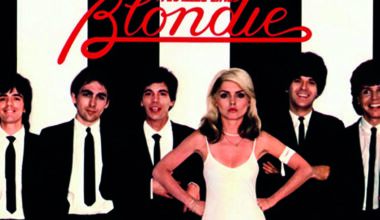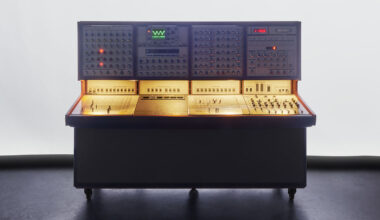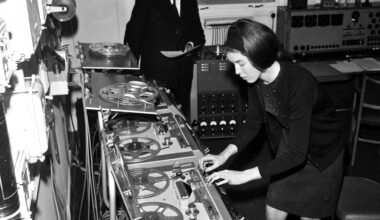With a deep interest in the weird and wonderful world around us, London synth obsessive Alice Hubble really hits the spot with her debut album, ‘Polarlichter’
The word “Hubble” evokes imagery of old technology that still feels like the future, of expanding humanity’s horizons and providing context for our sense of self in this sprawling universe. It is also a word that perfectly fits the synthpop persona of London-based Alice Hubley. Hearing the warm swathes of analogue synth sound on ‘Goddess’, her debut single as Alice Hubble, everything slots into place.
It’s a clear statement of intent from this self-proclaimed “synthesiser lady”.
We join Hubley at home in London, waiting on a delivery of T-shirts before heading off to support Pram in Cardiff the following day.
“I like to think of what I do as a feminine take on some of the 70s sounds like Tangerine Dream, but then also looking at the BBC Radiophonic Workshop, Delia Derbyshire, Daphne Oram, as inspiration,” she says of her soon-to-be released debut album, ‘Polarlichter’. And if you’re thinking she looks familiar, you’d be right. She is no stranger to these pages through her work in cult DIY synthpop duo Arthur And Martha and you may have clocked her work in psych outfit Mass Datura as well as indiepop collective Cosines.
While she’s still playing with Mass Datura, the Arthur And Martha project is officially “dead”, but following their recent one-off anniversary gig and remix album ‘Adjustments’, the connection is still there. Bandmate Adam Cresswell, who also performs as Rodney Cromwell, is set to release ‘Polarlicter’ on his Happy Robots label and the pair are working on the release together with no external press or management.
“It’s like Arthur and Martha are carrying on,” suggests Hubley.
Although the Hubble sound is underpinned by the analogue synthesiser music of the 70s, you can hear the influence of her childhood exposure to The Beatles and Simon & Garfunkel, her teenage love of Britpop and the discovery of electronic and experimental music through the genre-defying bands of the late-90s.
“As a teenager, the bands that really resonated with me were Yo La Tengo, Stereolab, and Birmingham bands like Broadcast, Pram, then Add N To (X),” she says. “That was when music got interesting for me, and when I think about it, they are the bands I return to time and again.”
After the life-changing experience of her teenage ears hearing Kraftwerk’s ‘Computer World’ album at a friend’s suggestion, she discovered not only New Order and synthpop, but the likes Tangerine Dream and Ash Ra Tempel. It was these artists who changed the rules of making music for Hubley. Taking up the piano at an early age and being told to play in a “regimented way” didn’t sit well with her.
“So hearing these acts and realising I could create my own music and do what I want was actually quite liberating,” she says. “I think it’s nice to take ownership and I know, for me, a lot of it is just my own self-confidence and I should just trust my own judgement and see how it goes. So to me, ‘Polarlichter’ is a self-indulgent record that I made on my own, for myself and it developed from that.”
Sketching the album’s riffs on an iPad during long train journeys, the recordings were pieced together on her collection of vintage synths and Mellotrons. The tracks were polished off at Big Jelly Studios in Ramsgate with Mikey Collins of indiepoppers Allo Darlin’ on production duties.
The first fruit, the aforementioned debut single ‘Goddess’, received a swathe of positive reviews, prompted an Introducing… piece in this very magazine and gained serious support from Steve Lamacq, who played the track to death on his BBC 6 Music show. What’s more, in the short period as a solo act, the Alice Hubble project has already shared a stage with the likes of krautrock legend Damo Suzuki and former Hefner frontman Darren Hayman.
Listening to ‘Polarlichter’ it’s easy to hear why it is making a connection. It’s an album that embodies her sense of liberation, with a mixture of big electropop tunes like feminist ode ‘Goddess’ and forthcoming single ‘Kick The Habit’ (a glam stomper in the vein of Goldfrapp or Ladytron), with spacey instrumentals like ‘Atlantis Palm’, which, built on a simple synth backing with two Mellotrons weeping in and out, is a clear homage to those 70s pioneers of electronic music.
The timing of this album is not entirely accidental. Hubley speaks fondly of the rich seam of female electronic producers changing the face of the art form right now and acknowledges the platform it creates for her.
“There are so many amazing female artists who I’m excited about at the moment,” says Hubley. “There’s Hannah Peel, and I love Rebecca Taylor’s Self Esteem project and her album that came out earlier this year. It’s great to see her doing that, she should’ve been doing it the whole time she was in Slow Club. Then there’s all the bands on Fire, like Jane Weaver, Vanishing Twin, Death And Vanilla… I’d feel very honoured if people consider the Alice Hubble record in the same way.”
It’s a sad fact that, even now in 2019, female artists still have to battle to get heard in the same way as the men. Hubley is acutely aware of this, and it is even addressed in her chosen name.
“I added the Alice so people know it’s a woman,” says Hubley. “The fact that I am female is important. When I was getting interested in electronic music and synthesisers, I never really thought about being a woman when I started dabbling. People are crazy to think otherwise, but you do still get labelled as a ‘female musician’ where a man is just a ‘musician’.”
With a clear intent to make a point about gender roles in our modern world, ‘Goddess’ doubles down on sexual obsession and objectification.
“It does have a feminist message and I am quite proud of that,” says Hubley. “You can tell stories and provoke with music, and that is very important to me.”
The song’s sinister lyrics tell the tale of a man so obsessed with a woman that she becomes just an object, a thing to own at any cost.
“It was based on experience, but it’s not directly a story about me,” she says. “It’s a fabrication, but the idea of the male gaze can be destructive, especially now with the internet and apps like Instagram. The song is hinting at a slightly extreme version, but with songwriting you always need to go a little more extreme or you don’t necessarily get the message across.”
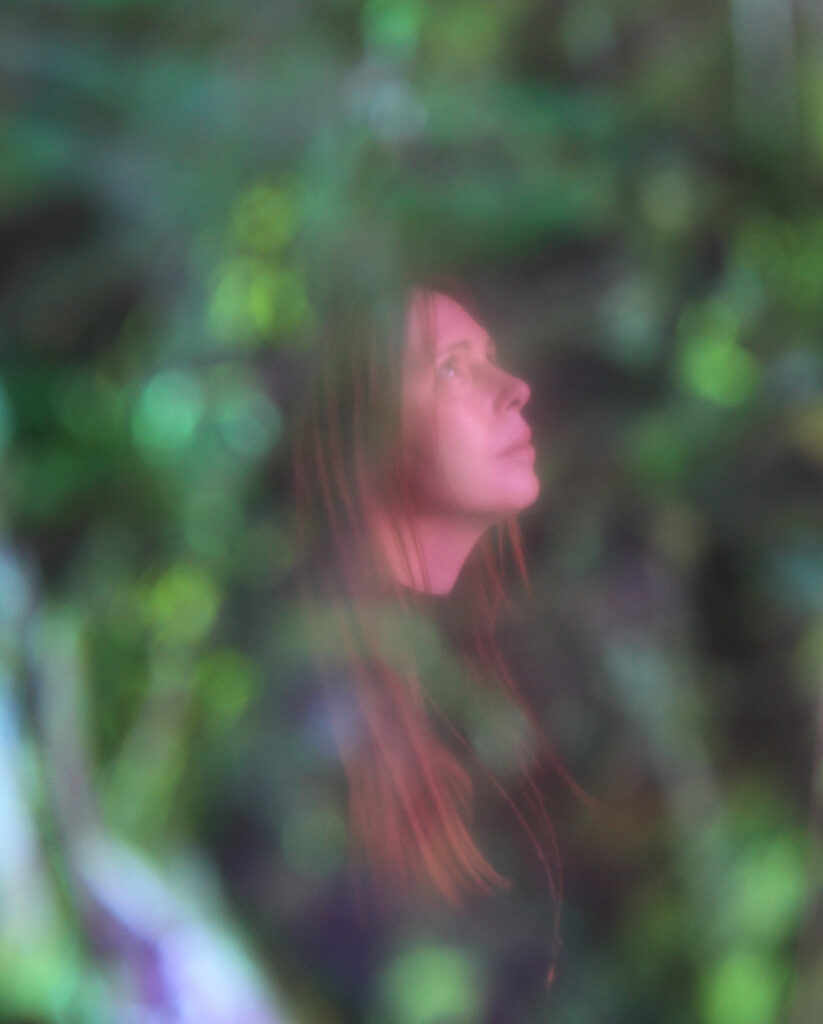
But ‘Polarlichter’ has more to offer beyond the political point-making. It also reflects Hubley’s deep fascination with the wider world and the magnificence of “places and situations”. Everything has a personal connection, even the title ‘Polarlichter’, the German for Northern Lights.
“I’ve got some guides here,” she says picking up a pamphlet that’s lying around in her house. “This came from a shop in Berlin a couple of years ago and the images, which are taken from the German equivalent of the ‘Encyclopedia Britannica’, are just beautiful. I’ve always been fascinated by the Polarlichter, especially this particular one, which we used for the album cover. It was actually spotted in Guildford in 1870. Imagine looking out your window and seeing that!
“I haven’t been to Surrey in years, but my grandmother lived not far from Guildford and we’d often visit when I was a kid, so there’s this strange connection there with the record. ”
With her interest in the phenomenon of the Northern Lights, it’s clear the emotions triggered by mentally journeying to “mystical and special” places are key to Alice Hubble, and she’s not short of connections to strange goings-on. Take instrumental ‘Ruby Falls’, named after an underground waterfall in Chattanooga, which was turned into a tourist attraction in the 1920s.
“For whatever reason, in this beautiful, natural landscape they’ve put all these coloured lights,” she says.
“It’s this kind of a psychedelic experience, but it’s also a place of natural beauty. It’s pitch black and then the lights come up and there’s this fanfare.”
‘Atlantis Palm’ evokes a similarly surreal situation, named after a spam email send to Hubley in her old job, working in marketing for a hotel in Dubai.
“There was this image of a ring with a picture of the hotel in the middle of it. There was fire, an aeroplane and a dolphin. It was almost this crazy sci-fi ‘Lord Of The Rings’ advert for this hotel,” she says, still slightly baffled by the imagery. “I got obsessed with that picture and its representation of the hotel.”
Much of what makes Hubley tick is obsession and this can be said of another of her long-standing loves – her beloved collection of synthesisers. Far from the machine austerity that many people feel from the instrument, Hubley finds a connection and real emotion in the sounds they emit.
“I tend to leave the synths around all the time, to remind me that I should play them lots,” she says. “There’s a warmth to the sound and something quite deep about it too, it doesn’t feel electronic to me. It feels like you are communicating this emotion through the synthesiser.”
Despite her large collection, there are three classics that she returns to for the Hubble project.
“I tend to come back to the Korg MS-10, the Juno-60 and the Moog Prodigy. To me, that trio are the budget synths of the time, but you’ve got everything covered with them.”
By harnessing the power of this collection of old machines and aspects of her wider career, such as the use of live drums alongside the programmed beats, ‘Polarlichter’ is a creation of real depth that expresses Hubley’s very human side. While her pioneering heroes often sought to create something detached from our reality, it’s an edge that makes her music more than a simple homage.
“If I didn’t think there was any emotion in it,” she says, “I would be unsure if it was as good as it could be. With the music I make I want to project this emotion and feeling into it. I want the songs to feel like they have a soul.”
As the debut album is released, Hubley is already putting together a follow-up, heading into the studio this month to record with a plan to finish things off in early 2020. October also sees a short headline tour in venues across the UK, with potential German dates already on the cards.
“I am excited to see where it goes,” she smiles. “I’d like to do some music for films, I’d like to tour more and perhaps do some festivals next year. With ‘Goddess’ we were so surprised and delighted with the response so it’s now all about getting everything in place to make the most of it.”
‘Polarlichter’ is out on Happy Robots
